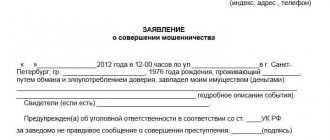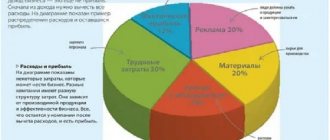Although today there are many opportunities to find an apartment suitable for purchase on your own, many prefer to turn to realtors in the hope that professionals will find the most profitable and reliable options. But the realtor on whom such hopes are pinned may himself be the source of problems. How do realtors deceive and how to avoid fraud, deception and deceit when buying an apartment? We tell you in this article.
Deceiving realtors when selling an apartment (that is, buying for you as a client) is possible in many ways. Let's list the main ones.
Placing non-existent objects on notice boards
This method cannot be called fraud; rather, it is misleading a potential buyer. Most often, a realtor's goal is to attract potential clients.
The scheme is as follows:
- A good apartment (or other real estate) is posted on bulletin boards (most often on Avito) at a very competitive price.
- The realtor adds fake or other people’s photos (or of a property that has already been sold). More experienced people post a lot of photos and write a detailed description of the object, while amateurs limit themselves to 1-2 photos and a brief description.
- A stir is created around the property and you have an irresistible desire to buy cool real estate cheap.
- You call based on the ad or contact via chat on the site - and here there are most likely 2 scenarios: the realtor immediately says that the property is sold and obsessively offers another (supposedly similar) or says that the ad is relevant and invites you to the office (or to meet in another place).
- You are invited to the office or offered a meeting on the street (supposedly near the facility).
- An inexperienced realtor will try not to answer your questions and quickly persuade you to meet in person. An experienced one will have answers to frequently asked questions, but will also focus on viewing the property
- You come to the meeting in a good mood and then it turns out that the property has already been sold or a deposit has already been paid for it. The realtor, in order to look like an honest person, says that the property was purchased from minute to minute and he did not have time to inform you. Of course, such a situation may well happen and it is not a fact that this is a deceiver.
- And here the fun begins - the realtor begins to persuade you to look at similar options , which in his opinion are no worse, and maybe even better than the current one. Most often they try to push you into a less profitable option or a problematic object. But there are situations when a realtor offers good options (but still less profitable).
- An alternative way of developing an event is the situation with a deposit. As a rule, demanding a deposit on the street urgently is the first sign of fraud.
- Success for a realtor will be to persuade you to look at his other properties , but in the case of a deposit, they will simply cheat you and you will never see the money again.
What should you do to avoid becoming a victim of a fraudulent realtor? The resulting action plan specifically for this scheme is described below.
Straw buyers
We are all designed in such a way that an object becomes more desirable to us if we see that there are other contenders for it. Unscrupulous realtors sometimes bring in “straw buyers” - people who play the role of those who want to buy the apartment you like. Using this as an argument (“The property is in demand, and they are willing to pay even more!”), the realtor will not only persuade you to buy, but also try to increase the transaction price or his commission.
How to deal with such deception?
Even if you see that someone else wants to buy an apartment, do not give in to emotions and do not let this fact influence your decision. Weigh the pros and cons, without taking into account real or perceived demand. If you see that your “competitors” are ready to engage in dialogue, it makes sense to talk to them carefully and try to find out how serious their intentions are. At the same time, evaluate whether these buyers are real.
How to act so as not to waste time and not miss a profitable object
- When calling by phone, persistently ask the seller (it doesn’t matter if it’s the owner or the realtor) whether the offer and the price are relevant. If the seller assures that the object is really being sold at this price, warn him that you are not considering other options (if this is indeed the case) and you are interested in this particular object.
- Immediately ask if the property has any legal restrictions or problems (for example, with heating or sewerage).
- Ask the seller directly whether he is a representative of a real estate agency or is engaged in private real estate activities. If this is an agency, look at their website and read the reviews (you can also read reviews about a private realtor by typing his initials into a search engine).
- Exact address - not all realtors are ready to disclose the exact address and there is one reason for this - this is his job and he is not interested in you buying real estate directly from the owner because in this case he will not receive a commission. This is normal practice, but you have the right to know the street intersection. Some divulge the exact address of the house or even apartment. All information received must be carefully checked and analyzed.
- You search the phone number through search engines and if you find negative reviews about the seller’s activities, carefully analyze them. Very often, realtors, when competing, write negative reviews to each other in order to win over clients for themselves. The best way out of this situation is to call the seller back and ask him about the negative reviews found. Based on the answer received, you can form an initial opinion. Even the best realtor may have negative reviews - this is normal, because you can’t please everyone. Your own intuition will help you in this matter. But experienced deceiving realtors use clean phone numbers, information about which is not available on the Internet.
- E-mail is another way to catch a scammer in the hand. Inexperienced lovers of easy money forget to change their email, and you can read reviews about its recipient - again through search engines.
- You take all of the above steps before meeting with a realtor. If the seller does not raise any concerns, go to a meeting and see the property.
- An important point is that it is better to call from a new phone number that was purchased for the purpose of calling through advertisements. We do not recommend using a personal number, because realtors, scammers and other undesirable persons will call you endlessly. You can use a virtual number (for example, Tinkoff Mobile or Yota have the ability to change numbers frequently without purchasing a new SIM card).
- If you are invited to an office, it is most often a real estate agency. There is nothing terrible here - except wasted time. When entering the office, immediately make sure that the object of interest really exists. If excuses and stories about the sold property begin, turn around and leave. Don’t forget to add such realtors to the blacklist on your mobile phone (you can help other people and write a negative review about their activities on special sites).
- Of course, if you come to the agency and there is a polite realtor in front of you and he assures that there is an object that is no worse than the one sold, you should listen to him. Perhaps this is true and you can actually buy real estate at a profit. However, if you are intrusively offered to go and look at this supposedly similar object without disclosing details (except for the exact address), do not agree (most likely you will not see anything profitable there)
- If you are offered a meeting on the street (supposedly near the property) or in another place, most likely this is a private realtor and this is a more dangerous option. If in an agency you very rarely come across fraudulent realtors, then a private realtor will scam you very easily.
- Before any viewing of a property, you need to look at the approximate prices of real estate in the area (so that you are not sold a home at an inflated price).
- You need to repeatedly ask the seller about any problems with the property. In most cases, deceiving realtors hide the legal or physical problems of the property until the very end. At a minimum, you will waste a lot of time, at a maximum you will have a lot of problems. Clarify every moment, do not hesitate to be meticulous.
- You can look at similar properties (in a sold situation) only with a realtor who inspires trust and follows business ethics. Just ignore everyone else.
- Let's consider the option when the realtor says that a deposit has already been paid for the property. Perhaps he is not deceiving and someone really beat you to it (remember that the offer was really profitable). An honest realtor will not offer you to pay a larger deposit or to buy an apartment on an accelerated basis, but he may offer another property (since it is his job to sell). At this stage, never rush, even if you are convinced that there is no other such object in the city.
- Separately, it is worth noting the situation with the deposit - the fraudster may demand a deposit on the spot (allegedly he has a buyer, but he wants to sell the property to you). Never give any deposit without documentary evidence, otherwise you risk saying goodbye to this money.
- And one more small but important detail - for example, a woman’s initials are indicated in the ad, but when you call, a man answers (or vice versa) - this is a reason to additionally check the seller for fraud.
These were 17 simple tips that will help you recognize a fraudulent realtor and not waste your precious time.
A small digression: if you are looking for real estate in Krasnodar or the Krasnodar region, the KAYAN Housing Center will be happy to help.
With us, you do not have to go through all the stages of checks according to the scheme described above - since all the objects we sell are real and the prices are indicated accurately. Even if this sounds like self-promotion, few agencies can boast of only real objects on the website, a truly honest approach and a working quality service (we work in the interests of the client).
Possible risks and popular fraud schemes
There are a lot of fraudulent real estate schemes. Among them there are 3 frequently occurring ones.
Deposit
If a real estate agent is a scammer, he will require a deposit before the deal is concluded. Moreover, the contract states that the deposit is not returned if the buyer himself refuses to rent. After some time, various circumstances are discovered that were not discussed at the first meeting. Because of them, the buyer is forced to refuse the lease.
Sudden heirs
Outwardly, this fraud scheme is quite legal, but it has many nuances. For example, an apartment is rented at a price 20% below the market price. The scammer realtor states the reason for the rent as follows: “the apartment was inherited, money is needed urgently.” A deal is finalized and after some time another heir appears, which creates the need for a long legal battle.
In such situations, the court quite often sides with the heir. Because of this, the transaction is declared invalid, and it is no longer possible to contact the realtor. As a result, there is no property and no money.
Fake documents
Fraudulent realtors quite often use fake documents when renting out an apartment. It can be quite difficult to distinguish these documents from real ones: you can find court decisions with seals and signatures, contracts supposedly certified by notaries, and certificates of ownership. Therefore, before concluding a transaction, it is necessary to carefully check all documentation.
Substitution of apartment addresses for fraudulent purposes
Here everything is much more serious because the buyer can lose a lot of money. We describe the entire scheme step by step:
- A realtor (or a person posing as a realtor) wants to sell a damaged (problems with repairs) apartment at a high price. Addresses are replaced according to the following principle:
- For example, an apartment without renovation or in need of major renovation is located at the address: st. Car enthusiasts 23 sq. 12 - our character wants to sell it at a high price. To do this, he rents a neighboring apartment (most often for one month), which is in excellent repair and often contains furniture and household appliances - ideally, this apartment is located on the same floor as the one for sale (for example, Avtolyubiteley str. 23, apt. 14).
- The fraudster changes the sign with the apartment number on the door (both on the one being sold and on the one being rented) and naturally shows the buyer an apartment with excellent repairs, but according to the documents, he will try to sell exactly the destroyed one (the one without repairs).
- The buyer does not notice the substitution and is ready to buy an apartment (most often apartments follow this scheme). An inexperienced fraudster will begin to rush through the registration of the apartment (this will help to recognize him).
- The scammer is not always able to rent an apartment on the same floor or in the same building. Most often this is a neighboring house, since most people can quickly match the floor and apartment number. However, in high-rise buildings (16 or more floors), it is not always possible to immediately determine which apartment numbers correspond to the floor.
- In the case described above, he will try to meet you not at the door of the object (as usually happens), but somewhere nearby in the area (for example, at a metro station). Then, using the car, you will be driven to a pre-prepared house to hide the catch. Most often this happens in residential areas - where the houses are identical.
- After viewing, an agreement is concluded with you (where, of course, a valid address is indicated) and you become the “happy” owner of a destroyed apartment that requires huge investments while significantly overpaying.
Working in contrast
In order to sell not the most profitable option, unscrupulous realtors may first offer several absolutely terrible ones. After run-down apartments in bad areas, even very average housing will seem very attractive to you. And since the realtor will not offer anything better (after all, his goal is to sell exactly this “average” option), the option will seem especially attractive.
How to deal with such deception?
Evaluate each apartment independently, without regard to those that were shown to you before. If the intermediary promises to find an attractive option, but over and over again leads you to "bedbug infestations", this is a reason to think about whether they are trying to deceive you.
How to avoid getting into this situation and spot the scammer
- Before viewing, use online maps to view the house in which you are going to buy an apartment. Determine where it is located relative to the streets and their intersections. The most complete information is provided by Yandex maps and 2GIS (not everything is immediately clear in Google maps). This way you will immediately understand that you are being taken to the wrong house.
- The situation is more complicated if the apartments are located in the same building or on the same floor. Feel free to count the apartments and compare them with the floor , and also check the same plates with the number (they can also be compared by analogy with other floors). It’s better to be looked at as a fool than to become a victim of scammers.
- Advice - arrive at the site in advance and study its location using maps on your mobile phone (geolocation).
- Do not be distracted by conversations that are not related to the sale of the apartment. This is how scammers try to lull vigilance.
- When you are satisfied with the apartment, do not rush to decorate it. Even if it is intrusive, you can ask your neighbors about their apartment (but they can also lie).
If you follow all the steps listed above, the chance of being deceived by this scheme tends to zero. But there is an even more sophisticated scheme, which will be discussed below.
They ask for an advance and then don’t give it back
Sometimes before the transaction the buyer is asked to pay part of the amount. And if the deal falls through, they don’t give it back. In fact, if you refuse to purchase, you cannot be charged other than the intermediary's work, if such conditions were agreed upon separately.
How to deal with such deception?
Write down all amounts to be paid in the contract. Do not give any money if you are not sure that you will buy an apartment, and do not promise the realtor a fee for work that in reality will not bring you any benefit.
Incompetent property owners
Quite an old method of fraud, although many still fall for this trick (with the help of realtors - scammers).
Detailed description of the scheme with incapacitated sellers:
- The scammer finds a pensioner (or other incapacitated citizen) and offers him “easy money.” Finding a pensioner in need is not difficult.
- The pensioner (or disabled person) agrees and enters into a conspiracy with the fraudster.
- The fraudster places an advertisement for the sale of an apartment (or house) and can reduce the price to quickly find buyers. As a rule, the scammer is well versed in real estate and quickly finds people willing to purchase the property.
- The buyer inspects the property, decides to purchase and enters into a transaction with an incapacitated citizen (who may appear to be capable).
- Next, the incapacitated seller goes to court and asks to terminate the transaction - providing a certificate of incapacity. In most cases, the court sides with the pensioner.
- The deceived buyers are asked to return part of the money and close the case in court. The majority agrees - as part of the money is better than losing the apartment and all the money.
- An incapacitated citizen shares money with a fraudster, and the buyer is left with nothing .
In this way, a fraudster can sell the same apartment several times and make decent money.
Laws
This topic falls under the jurisdiction of the following regulators:
- Civil Code of the Russian Federation (Chapter 39, § 1, 3–4 of Chapter 59). This is the main document regulating contractual relations in our country. All issues related to the execution of contracts are resolved in accordance with this document.
- Law of the Russian Federation dated 02/07/1992 No. 2300-1 “On the protection of consumer rights” (Articles 12–16, Chapter 3, Article 43). If a citizen enters into an agreement with a legal entity or individual entrepreneur (officially having this status), he is under the auspices of the Law “On the Protection of Consumer Rights”. It provides for a wide range of sanctions for the offender - from the obligation to provide the service properly to fines and damages.
- Criminal Code of the Russian Federation (Articles 158–159, 170, 170.2, 200.3). In most cases, agencies and realtors try to disguise the crime, since if it is discovered, the consequences for such “entrepreneurs” will be very serious.
- Federal Law of December 30, 2004 No. 214-FZ “On participation in shared construction of apartment buildings and other real estate and on amendments to certain legislative acts of the Russian Federation.” Attention! Suitable only for cases of searching through an agency or realtor for housing under construction (the so-called share building), if the developer and realtor are the same.
Selling a home to multiple buyers at the same time
The method is designed for “fools” - but a cunning realtor-fraudster can easily deceive you using this scheme.
The scheme itself:
- The object of sale, as a rule, is a good apartment at a good price - to create a stir. It is posted on message boards, sometimes with paid placement in the top block. To create more excitement, a scammer can write: urgent sale.
- People quickly find an apartment and a queue of potential buyers is created , including you (after all, everyone wants to buy good housing at a good price).
- The scammer deliberately invites a large number of people to watch at the same time. Often the arguments for such actions are: lack of time or the need to quickly leave the region.
- The realtor insistently asks you to pay a deposit for the apartment and says that other buyers did not pay a deposit and he refused them.
- Here the scammer’s task is to obtain a deposit from each buyer (ideally), while preventing them from contacting each other ahead of time. Then he simply disappears with the money.
- As a result, you arrive at the purchased apartment and see that in addition to you, several other buyers have paid a deposit and signed documents.
When does a realtor lie?
In real estate transactions, as in many other areas, there are cases of fraud. This could be the sale of a “cunning” privatized apartment (with a relative in prison), it could be a “cunning” developer (who is not going to complete the house), or it could be a landlord renting out a non-existent apartment. But a certain share of fraud also occurs among those who, in theory, are supposed to save from this fraud - namely, realtors.
Oddly enough, they quite often become figures in crime chronicles. Here are some high-profile stories of fraud involving realtors:
- in Angarsk, a realtor accepted money “for safekeeping” from real estate buyers,
offering it as a safe transaction. The seller, obviously, did not see this money. As a result, she received 16 million rubles from clients for 10 transactions. And then - and the accusation of a crime; - in Lipetsk, realtors organized a fictitious transaction on behalf of a deceased woman
. An elderly woman similar to her was brought to the MFC, where she “sold” her home to an accomplice of the scammers, who then resold this apartment, even with a mortgage. The victim turned out to be the heir of the deceased woman; he is now suing the buyer of the apartment (who is now suing a completely conscientious buyer; - in St. Petersburg, six realtors forged documents and received the right to escheat the property
of two apartments that were left by deceased owners; - in the Tomsk region, a group of realtors offered mediation in the real estate sector, but did nothing other than receive money
. The result is more than 70 victims and a criminal case.
And there are a lot of such stories - most often realtors, under the guise of an apartment, offer clients only their services in finding it
. Moreover, they sell services under a contract, and it is easier for the client to pay and forget about their money than to try to terminate the contract.
At the same time, those who tried to carry out some kind of real estate transaction may consider completely “normal” realtors to be scammers
– it just seems to many that for the commission that intermediaries take, they provide somehow too few services (for example, limiting themselves to posting advertisements on public sites). But here there are simply market relations - there is a “product” (the intermediation service), and there is a “merchant” (the client who agreed to use the service).
In any case, anyone who needs to conduct a real estate transaction should know how to identify a realtor who is simply not very good and distinguish him from an outright scammer. We talked to experts who told us about the most obvious signs of fraud.
How to avoid falling into a scheme with multiple buyers
It's simple - you don't need to give collateral. Yes, there are situations when you can give a deposit, for example, if the realtor is from a large agency. Before you give a deposit, be sure to:
- Carefully read the real estate purchase and sale agreement
- Check to see if there is a contract for the provision of real estate services (it must be in place, otherwise you may be scammed)
- Check the documents for the property itself (owner documents)
To avoid mistakes, do not rush with the paperwork and the purchase of real estate in general.











